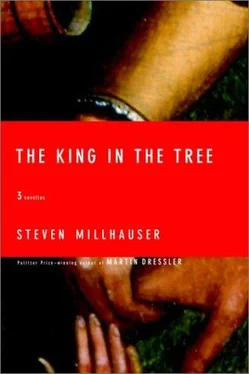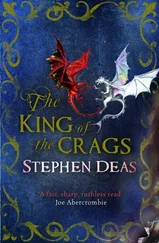Scarcely had they passed through Arcadia when Hood began to speak eagerly about a more recent representation — a venture into the Saxon past. After a time they came to a realm of thick forest and swampland; dark islands rose from the marsh. Here, Hood explained proudly, stood the Isle of Athelney; here during the Danish wars, when all of Wessex was on the verge of a humiliating defeat, King Alfred had retreated for seven long weeks, brooding over the fate of England, waiting for the chance to strike back at his enemies, and emerging at last to defeat Guthrum at the battle of Edington. Hood showed Juan the dense thickets of alder, the fort of the brooding king, the wild deer, a rough wooden bridge; and here and there Juan could see, deep in the alder woods, an ancient Saxon disappearing into the gloom.
But Hood could scarcely suppress his impatience to show Don Juan his latest representation, still under way in a remote corner of southwest parkland. “This way!” he cried, as he broke into a gallop across a field of yellow wildflowers. “Faster! Zounds! I’ll take you to the end o’ the living world!” Juan, spurring his horse, felt the excitement of it — the irrepressible squire had a way of making you feel like a twelve-year-old boy following an adventurous fourteen-year-old brother. They dashed over meadows, slowed to a walk through narrow forest paths darkened by overhanging branches, splashed through rushing streams, startled hares and deer, burst into secret glades trembling with sunlight, until at last they came to a dark lake bordered by gloomy hills. Here Hood dismounted and motioned for Juan to tie his horse to a thick branch. Eagerly he led the way on foot along the edge of the dreary lake, which emitted a stench of sulfur. “ ’Twas said that birds flying over this noxious lake would sicken and die. Hah! What have we here?”
They had come to a high cave partially concealed by dense bushes. Above the entrance hung a stone plaque in which were carved the words FACILIS DESCENSUS AVERNO. Underneath, in smaller letters, stood four lines of verse:
Smooth the descent and easy is the way
(The Gates of Hell stand open night and day);
But to return and view the cheerful skies,
In this the task and mighty labour lies.
Dryden, Hood remarked — was Juan familiar with the English poet? — had taken a strong liberty by translating “Dis” as “Hell,” although the more interesting question concerned whether Avernus referred to the lake proper or, by extension, to the Underworld itself. The opinion of the learned was divided, some saying that Averno must mean to Avernus, others that it could only mean by way of Avernus. However that may be, he remarked as he led Juan into the cave, he had chosen to call this representation Avernus, for the simple reason— “Hah! Well! I see you enjoy my little effects.” Juan had drawn his sword as a hissing form half emerged from the shadows. “ ’Tis the Lernean Hydra,” Hood explained, nodding toward the retiring monster. “She o’ the many heads. In this art, Sir,” he added, “shadow is all.” In a trembling blackness lit by small fires, he pointed to shadowy creatures that half showed themselves and half withdrew. There lay a Gorgon, there a flamebreathing Chimaera, there Briareus of the hundred arms — but surely Juan knew his Aeneid? Beyond the tree of false dreams lay the shore of the river Acheron: there the souls of the dead fluttered moaning near the bank.
Hood led Juan into a broad flat boat. At one end Charon with his burning eyes and wild tangle of white beard stood in his filthy cloak knotted at one shoulder, gripping his pole like a grim gondolier. “ ’Tis only the buried dead may cross,” Hood said, sitting down on a wooden thwart. “The unburied must wait on shore for an hundred years.” “Are you and I the buried dead, then?” Juan asked with a smile. “We are all buried, in comparison with what may be,” Hood riddlingly replied.
On the far shore of Acheron he led Juan into the flickering dark. Here there was still much work to be done. The three heads of Cerberus lay in a heap, and Dido, dressed in black and looking rather bored, sat at a small table playing patience by the light of a lantern. A fork in the path led to Tartarus on the left and Elysium on the right, both under construction. Hood led him to the left, through a passageway that opened into a torchlit place where laborers struck at the walls with picks, pushed carts laden with rocks, or sat wearily on barrels, eating bread and cheese.
“And yet,” Georgiana said a few hours later, “you cannot deny that all of Nature is the work of a great Designer.”
“Come now, I do not deny the existence of a great Designer,” Hood replied, as he cut into his roast goose. “I deny only that that existence may be proved from the evidence of Nature.”
“But — Augustus — what more evidence can there be, than the regularity and order of Nature? Night following day, the succession of seasons, the regular progress of the stars, the orderly development of the oak tree from the acorn and the rose from the rose seed, the marvelous mechanism of the human eye, so perfectly adapted for the sensation of vision — surely the sense of a Designer must present itself forcibly to a mind unbiased by ideas repugnant to reason.”
“Indeed, ’tis well argued,” Hood said. “I do not — upon my word, I do not deny the appearance of order in Nature. I deny only—”
“Appearance, you say!”
“Aye, just so: for what appears, may not be. Yet the appearance of order once being granted, I deny ’tis evidence of purposeful design. It may, with equal reason, be explained as the result of an accidental collocation of atoms, as in the system of Democritus and Epicurus.”
“What! My dear Augustus, you — why, ’tis the rankest atheism!”
“Nay, my dear Georgiana. ’Tis the rankest Reason. Come, have some more port, Mary. The white is better than the red. Is it my fancy, or does our friend Don Juan look as if he has just returned from the dead? Why, I’m only joking, dear. Pray, Don Juan, do explain my little riddle, else she’ll cook me and carve me and serve me up on a platter.”
After dinner, Hood retired to the library to read a paper in the Philosophical Transactions of the Royal Society, while Juan took a turn with Mary and Georgiana along the path of osiers on the bank of the Ymber. In the early evening light, a swan and five cygnets passed near the shore. Georgiana stopped to watch for a moment, while Mary, who had been agreeing that the spelling of English was much in need of reform, and who hadn’t noticed her sister’s interest in the swan, walked on several steps ahead. Juan, seeing that Georgiana had been left behind, inclined his head and said in a low voice, “I fear your sister has taken a dislike to me.”
“Why — why — but surely you are mistaken.”
“You see how she avoids us.”
“But I cannot understand—”
“Come, come,” called Georgiana, “what are you two plotting?”
“We were speaking,” Mary replied, coloring slightly, “about the irregularity of English orthography.”
The flush in her cheeks, the reflection of the osiers in the dark water, the shimmer of the lace frill on her square décolletage, the evening light falling on distant fields, the sense of sudden intimacy caused by his words and by Mary’s little falsehood, all this filled Juan with a sense of well-being, and that night, lying in his curtained bed, he recalled the pleasing scene as if it were a painting: the man standing with slightly inclined head, the woman close beside him, the second woman standing at a distance, her face turned toward them, in the soft light of dusk.
Now in the late mornings, whenever he walked with Mary and Georgiana along winding garden paths, or in the evenings when all four played together until supper, Juan seized any chance he had to exchange a word in private with Mary about Georgiana, or to speak with Georgiana while Mary watched across a distance. And Juan could feel, in the young wife, a quickening of interest, a ripple of feeling that was deeply familiar to him — for he was never mistaken, in such matters.
Читать дальше












